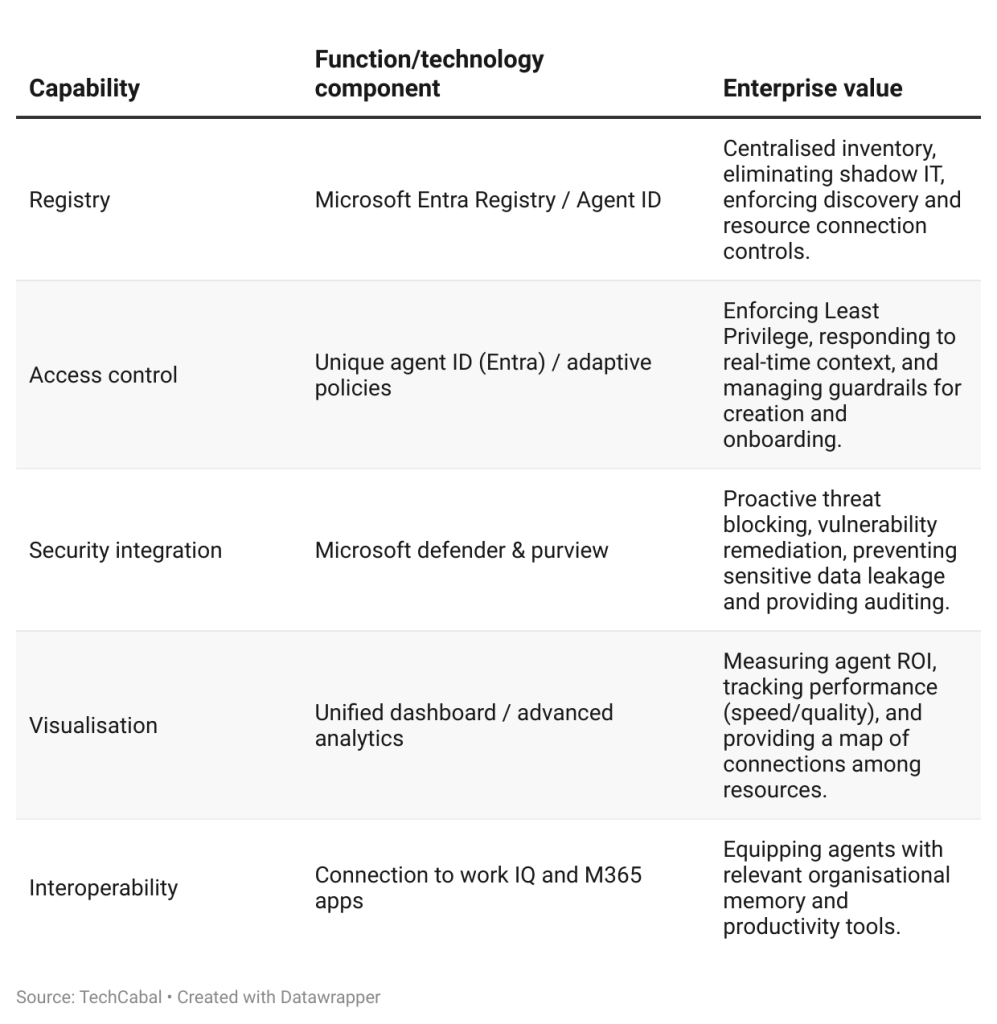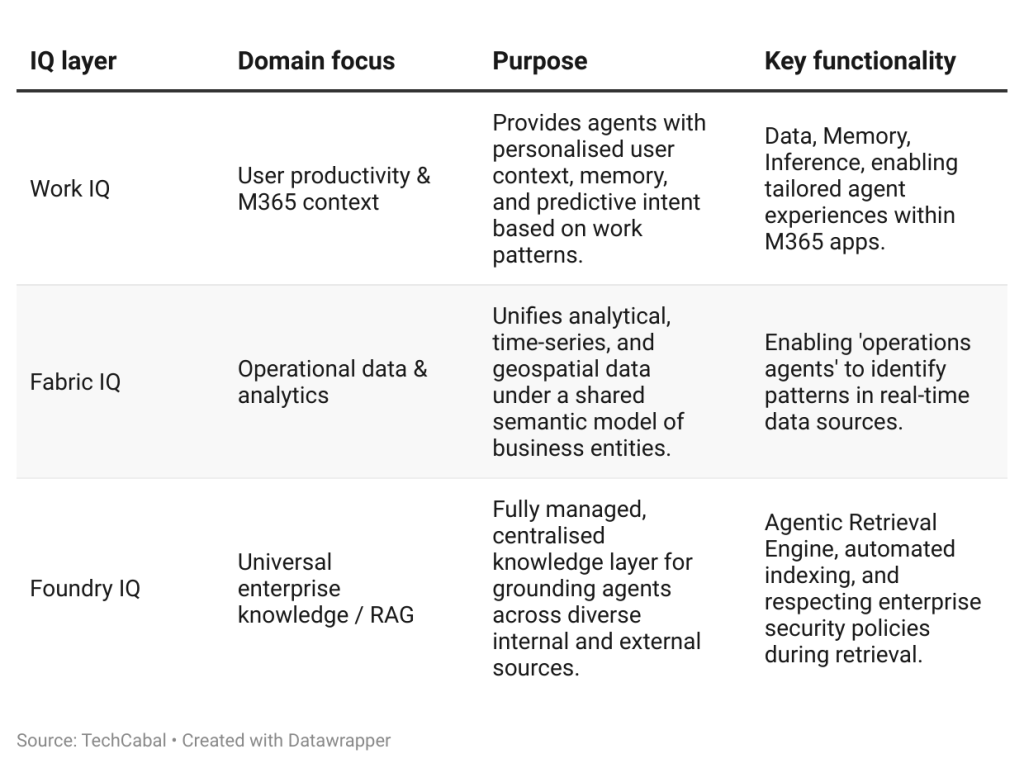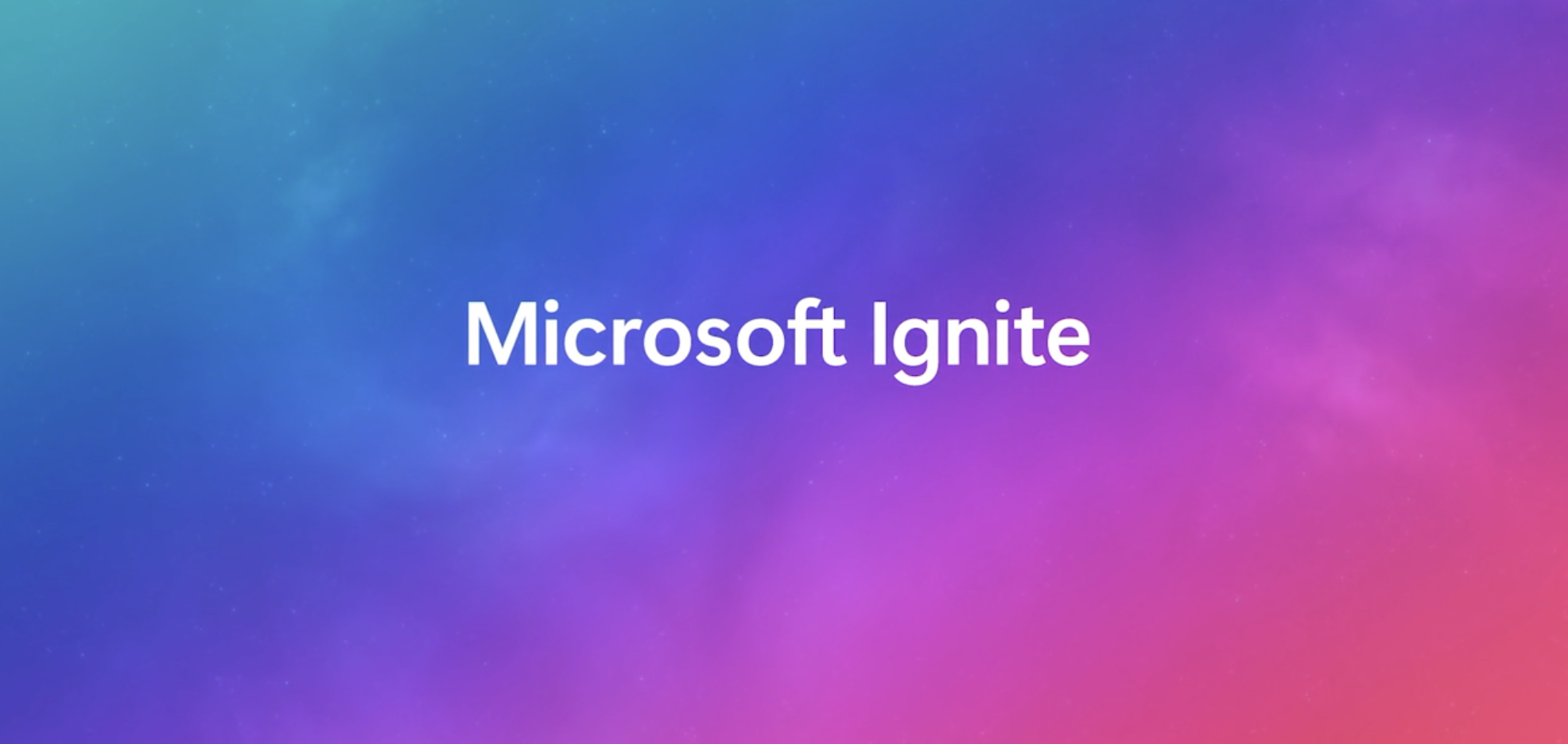Microsoft kicked off its Ignite 2025 conference in San Francisco this week, unveiling a slate of updates aimed at pushing enterprises beyond basic Copilot usage into a new phase of AI agent deployment. Running from November 18 to 21, the event brings together technology leaders to examine how increasingly autonomous systems will reshape work.
With more companies experimenting with AI agents that can act across multiple applications, Microsoft is positioning itself as the provider of a secure, unified environment for building and managing them. The company introduced an integrated stack designed to help you build, manage, and secure agents within your existing identity and data systems.
Announcement 1: Microsoft Agent 365
Microsoft introduced Agent 365 as the central control system for managing AI agents inside your organisation. It gives you one place to secure, monitor, and govern every agent you build or use. Instead of treating agents like simple tools, Agent 365 gives each one a unique identity through Microsoft Entra ID. This helps you control what each agent can access and reduces the risk of careless data exposure or misuse.
Agent 365 works across different platforms. It supports agents created with Microsoft tools, open-source frameworks, or third-party platforms to manage everything in one place. This makes it easier for you to keep your AI setup organised and safe.
Agent 365 focuses on four key areas.
- Registry: A central list of every agent in your company. This makes it easy to see what exists, remove agents you do not approve, and prevent hidden or unsafe agents from accessing your systems.
- Access control: Each agent has a unique identity, allowing you to set clear rules for who can create or manage agents. Risk-based access controls help you block any agent that behaves in an unsafe way.
- Security integration: Agent 365 connects with Microsoft Defender and Purview to protect your data. It blocks attacks, reduces exposure to sensitive information, and allows you to review how agents handle data.
- Visualisation: You get dashboards and insights that show how agents interact with people and systems. This helps you track performance, quickly understand issues, and improve how your agents work.
Table: Agent 365 core capabilities and enterprise impact

Announcement 2: The IQ Stack
Microsoft introduced the IQ Stack to provide AI agents with reliable, permission-aware knowledge. Instead of relying on complex RAG setups, the IQ Stack provides a single structure that helps your agents understand your data and make better decisions.
- Foundry IQ: the main knowledge layer. It gives you one secure place to store and organise the information your agents need. You can create topic-based knowledge bases, connect data from SharePoint, Fabric IQ, OneLake, Azure Storage, and even the web. Foundry IQ handles indexing and document structure automatically, so you don’t have to build custom pipelines. It also includes the Agentic Retrieval Engine, which improves search by breaking down complex questions and pulling information more accurately.
- Work IQ and Fabric IQ: Foundry IQ works with two other layers. Work IQ helps agents understand you, your role, and how your company works by using your files, messages, habits, and preferences. Fabric IQ connects diverse operational data into a single shared model, enabling agents to monitor signals and respond to changing conditions across your business.
Together, these layers give your agents the context they need to work with your data safely and consistently. The IQ Stack creates a single foundation that supports better grounding, better decisions, and higher-quality results for every agent you deploy.
Table: The Microsoft “IQ” knowledge stack

Announcement 3: Microsoft Foundry
Microsoft Foundry was introduced as the leading platform for building and running AI agents at scale. It gives your team a single place to design, test, and deploy agents without building complex custom infrastructure. The Foundry Agent Service, now in public preview, lets you create agents that handle multi-step tasks, work together, and keep context during prolonged interactions.
Foundry connects directly with Agent 365 and the IQ Stack. This means every agent built in Foundry automatically follows your security rules, gets a unique identity, and uses the same grounding system as the rest of your AI setup. You do not need to bolt on governance or compliance later.
You can build agents through the Foundry Agent Service or through Copilot Studio using Work IQ. Both paths give you secure access to your data while respecting sensitivity labels and permission settings.
Announcement 4: Built-in security and compliance for AI agents
Microsoft extended its security tools into the agent workflow to protect your data at every step. Purview and Defender are now embedded deeper into how agents search, retrieve, and generate information.
- Purview for Copilot Output: Purview Data Loss Prevention for Copilot blocks responses that contain sensitive information, such as confidential files or payment details. This helps you avoid accidental exposure when users prompt AI systems or when agents produce content. Purview AI Observability also provides your security team with insight into how agents behave, enabling you to track risks and investigate unusual actions.
- Compliance in the Retrieval Layer: Security controls now start at the knowledge source. Foundry IQ keeps Purview labels and permissions intact during indexing and retrieval. Sensitive content stays protected, and agents can only access information they are allowed to see. Purview enforces rules within the retrieval process and also during output generation, giving you two layers of protection that help you stay compliant across your entire AI setup.
Announcement 5: SQL Server 2025
SQL Server 2025 is now generally available and plays a key role in supporting AI agents by providing fast, secure, and reliable access to your operational data. It brings native AI features that let you run models close to your data, improving speed and reducing the work needed to deploy intelligent features in your applications.
The release also improves core performance. You get better workload handling, more innovative query processing, stronger failover support, and new tools that help you respond to heavy demand from your agent systems.
A significant upgrade is the built-in connection to Microsoft Fabric. SQL Server 2025 can mirror your operational data into OneLake with near-real-time updates. This removes the need for complex ETL pipelines and provides Fabric IQ with fresh data, which is essential for agents that need to act on live signals, such as inventory, logistics, or sensor readings.
Developers also gain greater flexibility through features such as JSON support, REST APIs, and change event streaming. GitHub Copilot now integrates directly with SQL development tools, making it easier to write and manage database code. Security is strengthened by Microsoft Entra ID, which provides a single identity system for users, agents, and data.
Final thoughts
Microsoft Ignite 2025 introduced a clear structure for building and managing AI agents at scale. Each product fits into a larger system that helps you build agents, govern them, ground them in trusted data, and protect your information.
You can build agents in Microsoft Foundry, manage them through Agent 365, and give them strong context using Work IQ, Fabric IQ, and Foundry IQ. Purview and Defender add protection, while SQL Server 2025 and Microsoft Fabric provide the fast, reliable data these agents need to perform well.
This setup provides a stable, secure path from small AI experiments to fully deployed agent systems. If you want to start now, the best first step is to explore Agent 365 in the Microsoft 365 admin centre and begin grounding your agents through the IQ Stack.











